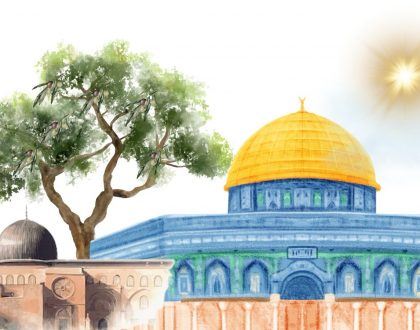Empathy
by Ayesha Khan
It’s so incredible how this little boy saved his brother. We saw in these agonising seconds how his mind was desperately trying to figure out what to do. He checks out all the angles. The sheer herculean strength that the little guy musters up to save his brother is just brilliant.
What this video highlighted to me was a quality that we all have, but is most acutely with twins.
Empathy. The ability to understand what someone else is feeling.
We see this quality accentuated in twins. I have noticed it in my own twins. There was an occasion when one twin got hurt and I was trying to help her, but it wasn’t her who was crying. It was her sister was bawling. Seeing her twin feel pain was causing her pain, even though she wasn’t the one who had hurt herself. I noticed it again when they went for their immunisations. Sara didn’t cry when she had her injections. However when her sister Amina had the injections they both began to cry; Sara couldn’t bear to see Amina in pain, so she started to cry too.
Why is it twins feel empathy? Do they feel empathy more than other siblings? Or other people? Why? Is it a sacred bond or is it the fact that they can identify with the other twin because they spend so much time together and have shared so much that they have their own feelings, but are acutely aware of their twin’s thoughts and feelings too?
Empathy comes from feeling that we have something in common with someone else.
This means that I can feel empathy for you as you go through your school years, because I have experienced it. But perhaps I do not have as much empathy for or an innuit or an aborigine? Can I imagine what it is like to be an aboriginal child? We can understand an ape better than an octopus or an elephant or an ant.
This quality isn’t unique to humans. Recently scientists have been looking at animals and noticed that they exhibit empathy.
Previous studies have shown that rats will lend distressed companions a helping paw, says Peggy Mason, a neurobiologist at the University of Chicago in Illinois who was not involved in the work. In a 2011 study, for example, Mason and colleagues showed that if a rat is trapped in a narrow plastic tube, its unrestrained cage-mate will work on the latch until it figures out how to spring the trap.
We’ve all heard how rats will abandon a sinking ship. But will the rodents attempt to save their companions in the process? A new study shows that rats will, indeed, rescue their distressed pals—even when they’re offered chocolate instead. They’re also more likely to help when they’ve had an unpleasant swimming experience of their own, adding to growing evidence that the rodents feel empathy.
In Islam empathy is crucial. Empathy gives us the ability to feel what someone else is feeling and it brings us closer to each other.
Prophet Muhammad* said: ‘None of you have faith until you love for your neighbour what you love for yourself’ [Sahih Muslim]
This takes empathy to higher level. That you feel so close to someone that you don’t draw a boundary between what you want for yourself and what you want for others, but you wish the best for them, as much as you wish for yourself.
At another time he said, ‘Whoever wishes to be delivered from the fire and to enter Paradise” should treat the people as he wishes to be treated.’ [Sahih Muslim]
The implications of this are that we are equal to others – not superior. There is nothing that makes us more special than anyone else.
It is important that we tap into this empathy and realise that we are all part of the same creation.
And when we acknowledge that it enables us and drives us to help each other in times of need, to share their pain or loss, to share their happiness and success.
God wants us to recognise what we have in common. Whether it is our neighbour, family, or even strangers. This why is in Islam there is a huge emphasis placed on helping travellers – because while they are estranged from their homes, the host city or village should reach out to them as fellow humans and be as hospitable as possible. A biker from England to Australia commented on this hospitality when he reached Muslim countries: that whereas in other countries they would point him in the direction of a hotel, in Muslim countries, when asked where he might find a lodge or hotel, people would frequently say, come and stay in our home.
Leopold Weiss was the son of an orthodox Rabbi born in Poland, and was a journalist who travelled extensively in Muslim lands. He said: ‘My interest in the nations with which I came into contact was in the beginning that of an outsider only. I saw before me a social order and an outlook on life fundamentally different from the European more mechanized mode of living… This sympathy gradually led me to an investigation of the reasons for such a difference, and I became interested in the religious teachings of the Muslims. …it opened to me a new vista of a progressive human society, of real brotherly feeling.’
The deeper he investigated, the more he was impressed, until he converted, changed his name to Muhammad Asad, wrote one of the best translations of the Quran and went on to become one of the most influential European Muslims of the 20th century.
The sense of brotherliness is that extension of empathy towards each other. In Islam, empathy doesn’t just extend to those we are familiar with – our neighbours, nor even strangers, but goes even further – and extends to our enemies. The Prophet Muhammad* said: ‘Do not be people without minds of your own, saying that if others treat you well you will treat them well, and that if they do wrong you will do wrong. Instead, accustom yourselves to do good if people do good and not to do wrong if they do evil.’ [Tirmidhi]
We are not supposed to wish ill for those who wish harm to us. As we come back to recognising that they are also part of God’s creation and deserve kindness, justice as well as courtesy.
The Quran says: ‘O you who believe! Stand out firmly for Allah as witnesses to fair dealings and let not the hatred of others to you make you swerve to wrong and depart from justice. Be just, that is next to piety. Fear Allah, indeed Allah is well-acquainted with all that you do.’ [5:8]
When we lose our sense of empathy we start to lose the sense that we are all human. We can see the impact of empathy when people donate to charity. For example, when the 2004 tsunami hit Indonesia and surrounding areas, there was an outpouring of grief and a massive amount of money was raised in charity. However a year later, and when a huge earthquake killed over 87,000 people in Pakistan the response was a fraction. Some commentators overserved that this was because holiday makers could empathise with the people of countries they had visited on holiday, but couldn’t identify with people in Pakistan who are frequently shown in a negative light by the media.
What happens when we don’t have empathy?
When we do not have empathy with another set of people, we can put them in a box and turn them into something entirely inhuman. As Hitler did. Or colonisers throughout history who have treated Native Americans, aborigines, and other nations they ruled over. It enabled the slave trade and in recent times the torture of suspects in Guantanamo Bay. It enables us to place the value of our lives, over and above the lives of others. Notoriously, the US secretary of state Madeleine Albright once defended UN sanctions against Iraq on an TV interview in which she was asked “We have heard that half a million children have died. I mean, that’s more children than died in Hiroshima. And, you know, is the price worth it?” Albright replied, “We think the price is worth it.”
A lack of empathy means we become suspicious of ‘them’; it enables us to override our sense of what treatment is acceptable or not – and allows leaders to demonise others and suggest that they it is ok to treat the inhumanely.
‘Whoever suffers an injury done to him and forgives (the person responsible), Allah will raise his status to a higher degree and remove one of his sins.’ [Tirmidhi]
Empathy is linked to love and peace. By contrast, a lack of empathy is linked to an inflated sense of ego, and sense of superiority. At its extreme it leads to violence and bloodshed.
We have to be very critical of the media which demonises any group of people. Is it really possible that one group of people can be completely vile? Or that all people have only one particular trait. When we are fed a narrative of hate, we need to see through it and question it.
*peace be upon him
Written by Ayesha Khan in 2017
Recommended Posts

Masjid al Aqsa – why it has a very special place in our hearts
November 29, 2023

Palestine: The Holy Land
November 23, 2023

